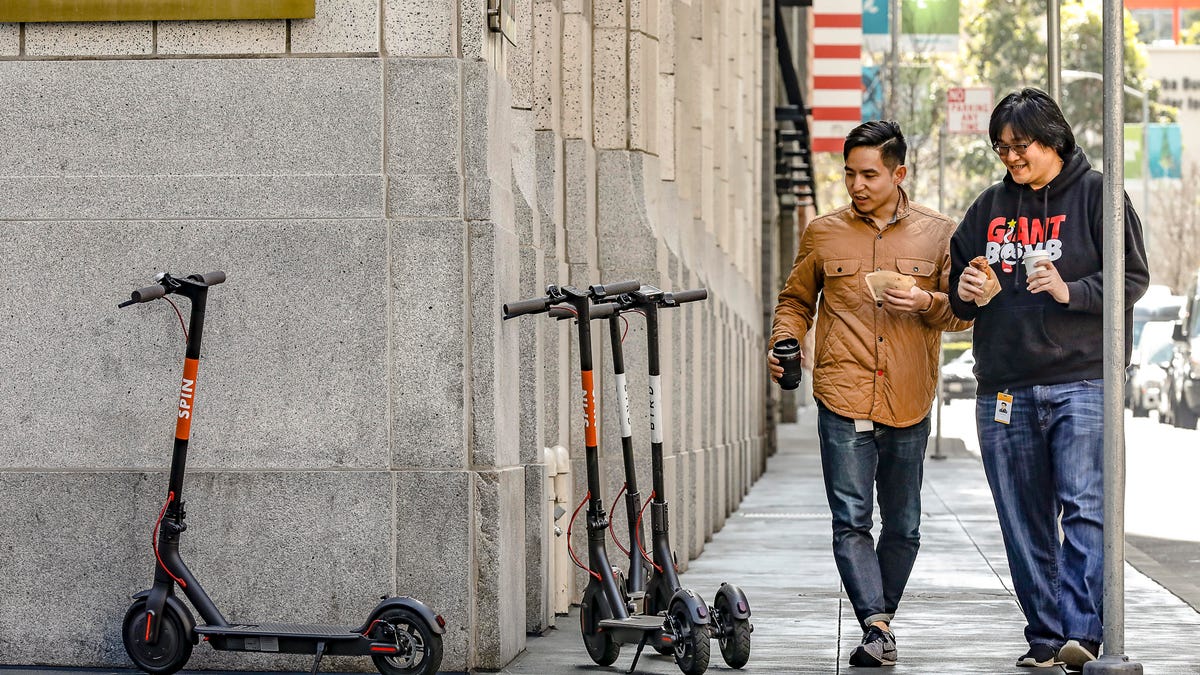The majority of scooters in LA are going to share your location with the city
For every three scooters that don’t share GPS data, 10 will.

Los Angeles gave permits for scooters last Friday, and requires them to provide location data.
Los Angeles is pumping the brakes on scooter companies that won't tell it what part of the city you're wheeling around.
Last September, the Los Angeles Department of Transportation said it would require all scooter companies to provide location data on the vehicles to help with city planning purposes. The data is collected by GPS on the scooters.
"Route information is provided to the city after the trip has completed and within 24 hours and it doesn't include the name, age, gender, address of the user," the agency said in a statement. "LADOT is asking companies to provide the start trip and end trip of every vehicle as trips start and as trips end to make sure scooters are being parked legally and within the terms of the permit."
The requirement raised privacy concerns because sensitive data would be handled by the city government. The government partners with data aggregators, like Remix, to analyze that information. Privacy advocacy groups, including the Electronic Frontier Foundation and the Center for Technology and Democracy, have publicly spoken out about these data requests.
"We at Remix are excited to help LA and many other cities use data to make better decisions and empower micromobility programs to be successful in the context of the larger transportation ecosystem," Tiffany Chu, Remix's co-founder, said in a statement.
It still isn't clear how long LADOT retains the location data, and there aren't public details on what aggregators can do with that information. What is clear: Companies that don't share the data won't be allowed to put as many scooters on the streets as those that do.
Companies that declined to provide the data were given a 30-day provisional permit to operate in LA, which were handed out last week, while those that agreed to hand over anonymized location data received permits for a full year, Motherboard reported.
LADOT is limiting more than the length of the permits given to companies concerned about privacy issues. It's also limiting the size of their fleets. The city is allowing Lyft, Uber and other companies that hesitate to share the data to operate only 3,000 scooters. Companies that offer the location data, like Lime and Spin, can grow to fleets with 10,500 scooters over the next year.
That means LA residents will be more than three times as likely to ride a scooter providing the city government with location data, which critics say raises privacy concerns.
"LADOT is punishing businesses for standing up for the rights of customers while companies neglecting their responsibility to consumer privacy are being rewarded with exclusive financial opportunities," an Uber spokesperson said in a statement.
Spin said that cities need data to make streets safer but raised concerns that its agreement with LADOT could have privacy issues.
"We are alarmed when cities force operators to share sensitive location data with third-party for-profit data firms, without stipulating that the firms do not use that data to meet private business goals," a Spin spokesperson said. "Going forward, we encourage LADOT to re-evaluate their third-party contracts to include strong safeguards for rider privacy."
Despite the disagreement, Spin said it still intends to provide its data to the city government.
Lyft and Lime didn't respond to a request for comment.
An LADOT spokesperson said Uber, Lyft and other companies can still apply for the full year's permit, which would grant them the same limits as rival scooter companies. All companies offering scooters must comply with the one-year permit requirements by April 15, the spokesperson said.
It's unclear what Uber and Lyft will do after the deadline. An Uber spokesperson said the company would comply if LADOT had detailed, public plans on how it will protect that data from misuse.
Location data is sensitive information, even if it's anonymized. A New York Times investigation found that people could still be identified through anonymized data by simply tracing specific commutes an individual would take.
For example, it would be relatively easy to associate an individual to location data if it constantly showed someone at his or her home address.
LADOT's plan to collect location data will likely expand beyond scooters. The agency hopes to collect location data on ride shares too.
Uber has its own history of sidestepping city regulations. Two years ago the company used a tool called Greyball to thwart authorities looking for cars being driven for the company.
While California has the toughest data privacy law in the US, the legislation doesn't apply to government agencies such as LADOT. The agency, in turn, gives that data to Remix, a private company, for analysis, creating another privacy concern.
Remix said it's "contractually obligated not to share that data" but didn't provide details of its contract with LADOT.
Originally published March 21, 2:03 p.m. PT.
Updates, 4:28 p.m.: Includes response from Spin; March 22: Adds response from Remix.
Correction, March 21, 4:28 p.m.: Clarifies what kind of data LADOT is requesting from scooter companies.

